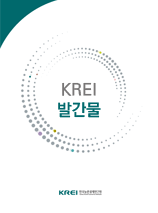
- How to Improve Professionality of Farmer Education & Training Practitioners
-

-
The purpose of this study was to explore the strategies for improving the professionality of farmer education and training practitioners. For the purpose, this study investigated the current problem about professionality of farmer education and training practitioners; identified the roles and competencies consisting of farmer education and training practitioners' professionality; analysed the need of farmer education and training practitioners through literature reviews, surveys, interviews, and experts reviews.
The literature reviews on farmer education and training practitioners' professionality and farmer education and training policies and researches have found that job environment of farmer education and training practitioners was so poor to execute normal education and training process and suggested strategies for supporting them to develop their professionality including extending learning opportunities.
Based on literature reviews on the roles and competencies of human resource development practitioners, and some modification of them with help of related experts, the specifics of the professionality were identified as follows: 11 roles including administrator, evaluator, education and training manager, material developer, individual career-development advisor, facilitator, marketer, need analyst, organizational change agent, program designer, and researcher; and 32 competencies including technical competencies, business competencies, interpersonal competencies, and intellectual competencies.
Based on survey and interviews on farmer education and training practitioners, the needs for professionality development in terms of education and training and job supports were analysed as follows: farmer education and training practitioners had educational needs for such roles as program developer, administrator, evaluator, material developer, and researcher rather than education and training manager, marketer, and organizational change agent; they had educational needs for technical competencies rather than intellectual competencies; while they had mental support from institutes, they needed job supports including extended education and training opportunities, incentives for education and training job, communication among other education and training practitioners, and expert consulting on their job.
From the above research findings, the following strategies for improving the professionality of farmer education and training practitioners were drawn: ① improving the importance of education and training domain in institute, ② providing well-organized education and training information and materials, ③ supporting training program customized by their career and institute and extending education opportunities including short term study trip abroad and excellent human resource development courses, ④ furnishing networking among education and training practitioners, ⑤ subsidizing expert consulting on their education and training, ⑥ improving the farmer education and training institute evaluation criteria to afford incentives to institutes trying to develop their practitioners' professionality, ⑦ expanding funding for institutes including adjusting unit training cost to realistic level, affording subsidy for developing their practitioners, and supporting the practitioners' tuition of various training opportunities, and ⑧preparing institutional fundaments including legalizing the above suggested supports, and installing farmer education and training supporting institute.
Researchers: Sang-jin Ma, Kyeong-hwan Choi
Research period: 2006. 8 - 2006. 11.
E-mail address: msj@krei.re.kr -
목차
-
1. 서론
2. 농업인 교육 훈련 담당자 전문성 관련 과제
3. 농업인 교육 훈련 담당자 전문성 영역
4. 농업인 교육 훈련 담당자 전문성 관련 요구
5. 농업인 교육 훈련 담당자 전문성 제고 방안
6. 요약
요약문
The purpose of this study was to explore the strategies for improving the professionality of farmer education and training practitioners. For the purpose, this study investigated the current problem about professionality of farmer education and training practitioners; identified the roles and competencies consisting of farmer education and training practitioners' professionality; analysed the need of farmer education and training practitioners through literature reviews, surveys, interviews, and experts reviews.
The literature reviews on farmer education and training practitioners' professionality and farmer education and training policies and researches have found that job environment of farmer education and training practitioners was so poor to execute normal education and training process and suggested strategies for supporting them to develop their professionality including extending learning opportunities.
Based on literature reviews on the roles and competencies of human resource development practitioners, and some modification of them with help of related experts, the specifics of the professionality were identified as follows: 11 roles including administrator, evaluator, education and training manager, material developer, individual career-development advisor, facilitator, marketer, need analyst, organizational change agent, program designer, and researcher; and 32 competencies including technical competencies, business competencies, interpersonal competencies, and intellectual competencies.
Based on survey and interviews on farmer education and training practitioners, the needs for professionality development in terms of education and training and job supports were analysed as follows: farmer education and training practitioners had educational needs for such roles as program developer, administrator, evaluator, material developer, and researcher rather than education and training manager, marketer, and organizational change agent; they had educational needs for technical competencies rather than intellectual competencies; while they had mental support from institutes, they needed job supports including extended education and training opportunities, incentives for education and training job, communication among other education and training practitioners, and expert consulting on their job.
From the above research findings, the following strategies for improving the professionality of farmer education and training practitioners were drawn: ① improving the importance of education and training domain in institute, ② providing well-organized education and training information and materials, ③ supporting training program customized by their career and institute and extending education opportunities including short term study trip abroad and excellent human resource development courses, ④ furnishing networking among education and training practitioners, ⑤ subsidizing expert consulting on their education and training, ⑥ improving the farmer education and training institute evaluation criteria to afford incentives to institutes trying to develop their practitioners' professionality, ⑦ expanding funding for institutes including adjusting unit training cost to realistic level, affording subsidy for developing their practitioners, and supporting the practitioners' tuition of various training opportunities, and ⑧preparing institutional fundaments including legalizing the above suggested supports, and installing farmer education and training supporting institute.
Researchers: Sang-jin Ma, Kyeong-hwan Choi
Research period: 2006. 8 - 2006. 11.
E-mail address: msj@krei.re.kr저자정보
저자에게 문의
구매안내
KREI의 출판물은 판매 대행사 (정부간행물판매센터)와 아래 서점에서 구입 하실 수 있습니다.
판매대행사
- (주)정부간행물판매센터http://www.gpcbooks.co.kr사이트 바로가기
- 서울특별시 중구태평로 1가 25번지
- TEL 02) 394-0337, 734-6818
- FAX 02) 394-0339
판매서점
판매서점 교보문고 http://www.kyobobook.co.kr/ 영풍문고 http://www.ypbooks.co.kr/ 알라딘 http://www.aladin.co.kr/ 활용도 정보
활용도 정보 상세정보 조회 좋아요 다운로드 스크랩 SNS공유 46170 2 34 0 0 - 같은 분야 보고서가 없습니다.
- 같은 분야 인기 보고서가 없습니다.
의견남기기
-


